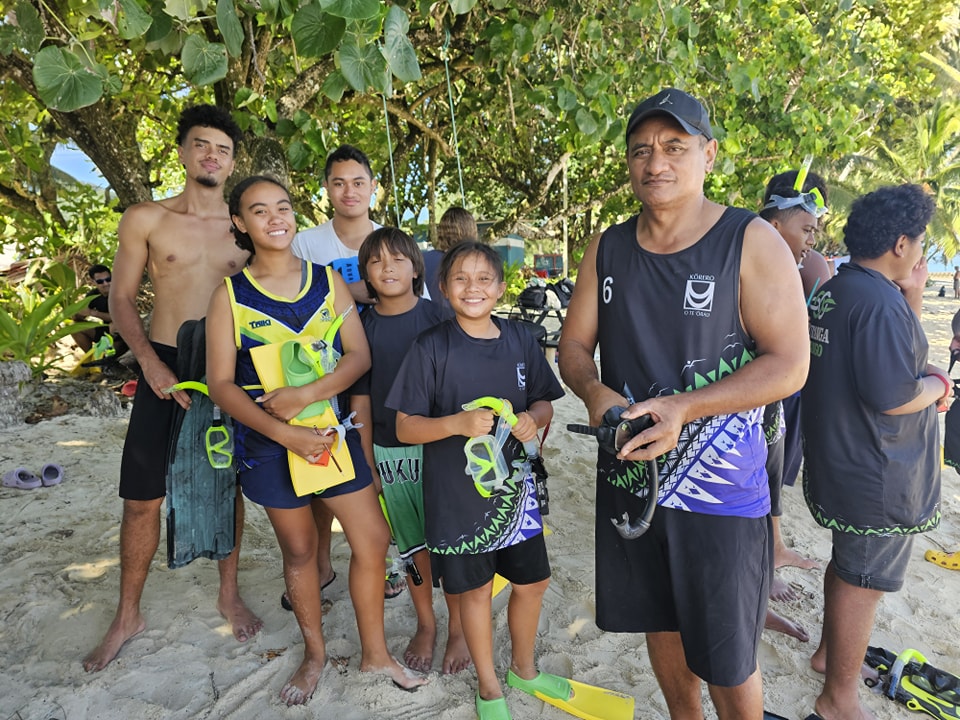Te Ipukarea Society: School holiday programmes dive deep into ecology
Saturday 27 April 2024 | Written by Te Ipukarea Society | Published in Environment, National

Dr Teina Rongo, right, with some of the participants from youth programmes Mata Nātura and ‘Ātui’anga Ki Te Tango (AKTT). Kōrero o te 'Ōrau/24040430
Over the last week of the school holiday period, Te Ipukarea Society and Kōrero o te ‘Ōrau have combined efforts to run their respective youth programmes Mata Nātura and ‘Ātui’anga Ki Te Tango (AKTT).
The senior youth programme has offered a variety of environmentally-focused activities, engaging 30 students in both theoretical learning and hands-on experiences aimed at fostering connections between our youth, their natural surroundings, and cultural legacy.
The week began looking into composting, specifically the process of composting as well as soil health and sustainable gardening techniques. Following the theory, the students built their own organic paper pots from recycled newspapers and planted mystery seeds, which they’ve been nurturing throughout the week.
The Ministry of Agriculture (MOA) in Arorangi hosted an engaging session about bee-keeping and vegetable and fruit plant nurseries. Mike Bowie (the bug man) gave a presentation on the revolutionary iNaturalist app. iNaturalist helps users identify plants and animals whilst also generating data for science and conservation. It establishes connections with a community of millions of scientists and naturalists who can help users learn more about nature.
Speaking with the Agriculture boys in the shade house brought a whole lot of new learnings, particularly in the art of grafting, where the branch of a lime was connected with a lemon tree to produce more abundant and bigger limes! Of note also was the AKTT students meeting and hearing from one of the original AKTT senior programme students from 2019, Te Ati Motu, who is currently employed at MOA. This is a testament to the programme and nurturing our youth who will become our future leaders in their respective fields of interest.
Tuesday began with a presentation on stream testing and monitoring, preparing students for a field trip to the Avana stream. In small groups, they tested dissolved oxygen levels, phosphates, electrical conductivity, and water temperature at different sites along the stream, and learned why these tests are done. They discussed the impacts of agriculture and human settlements on stream quality. Sharing and analysing data led to lively conversations among the students who now have a better recognition of the importance of healthy streams.
The afternoon was spent in Ava’avaroa passage with students observing the behaviours of Green and Hawksbill turtles found in this popular touristy space. Each team was equipped with a waterproof scribing pad to tally the turtles in the passage as well as a camera. The photos taken were used in Te Ipukarea Society’s turtle monitoring and tracking database. Like our fingerprints, turtles have unique facial scutes or patterns on the side of their face which can be recorded and cross-checked with new photographed turtle face patterns over time. The monitoring project tracks turtles around Rarotonga, and has found one Hawksbill turtle moving back and forth between Trader Jacks and Titikaveka while stopping in Rutaki, Avaavaroa and Papua Passage.
Marine Biology was Wednesday’s theme and included a guest speaker presentation by Te Ipukarea Society’s former intern Andrea George Uyehara. Andrea, originally from Aitutaki, spoke about her current university life in Hawaii studying Marine Biology. Andrea, who has also interned for the Ministry of Marine Resources and Sharks Pacific, is in her final year of studies. Plans to continue studying are on the horizon for Andrea who is now also considering studying Environmental Law.
A session with Dr Teina Rongo included a presentation on coral bleaching in Cook Islands waters and its impacts. The students learnt that coral bleaching occurs as a result of corals being stressed from warmer than usual waters, causing corals to expel the organisms (zooxanthellae) that give the coral their colours. The afternoon was spent observing bleached corals around the Boiler out from Trader Jacks.
Thursday’s rain didn’t ruin the fun. The students headed out to the Takitumu Conservation Area (TCA) to observe, record, and discuss the variety of plants and birds found within the 155-hectare site. The plants were categorised into native and invasive species, with students identifying the issues invasive species bring such as out competing the native plants. The TCA’S flagship bird, the Kākerōri, was very active with both the juvenile (yellow/orange) and mature (grey) birds observed. Half a dozen ‘Ī’oi were spotted. As a rather shy bird, it was fantastic to see so many ‘Ī’oi in flight and perched on the Albizia tree found at the lookout spot.
On Thursday evening, the students went night snorkeling in Titikaveka. It gave them an opportunity to see the contrasting health conditions between the lagoon and fore reef environment, with the lagoon being in a very poor state in comparison.
On Friday, the students had the opportunity to hear about Operation Taramea and to go out on boats to see the taramea on the fore reef. Dr Teina was able to pull a taramea up via freediving for students to observe it up close and personal.
With the ‘Ātui’anga Ki Te Tango and the Mata Nātura Senior Holiday Programme officially wrapping up on Saturday with a final church service on Sunday as a whole, we hope our youth walk away inspired to pursue careers in wildlife conservation, agriculture, and or marine biology. Nevertheless, no matter what field they enter, we hope they carry the core values they have learnt and hopefully will continue to take interest in these areas. They have definitely gained a strengthened commitment to safeguard and cherish their natural heritage.




















































